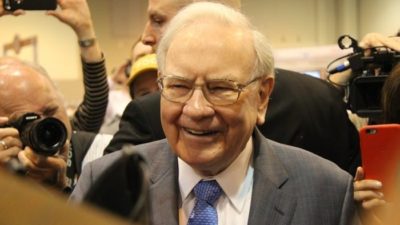This article was originally published on Fool.com. All figures quoted in US dollars unless otherwise stated.
This article was originally published on Fool.com. All figures quoted in US dollars unless otherwise stated.
Warren Buffett once told investors to be "fearful when others are greedy and to be greedy only when others are fearful." That's why it was alarming when Buffett's Berkshire Hathaway (NYSE: BRK.A) (NYSE: BRK.B) started selling a lot of its top positions -- including Apple and Bank of America -- in recent months and boosted its cash holdings to a record high.
That shift suggests the market is getting overheated and heading for a pullback. That wouldn't be too surprising, since the S&P 500 only trades about 3% below its all-time high and looks historically expensive at 22 times forward earnings.
Yet Berkshire has still been buying some stocks as it prunes its other holdings. One of those stocks is the cosmetics retailer Ulta Beauty (NASDAQ: ULTA). In the second quarter, it bought 690,106 shares of Ulta for $266 million at an average price of about $406. That equals 1.5% of Ulta's shares and accounts for 0.1% of Berkshire's portfolio.
Warren Buffett isn't making any money on that new investment yet. But at $380 a share, its stock still looks ridiculously cheap at 15 times forward earnings -- and it might just bounce back once the market warms up again.
Ulta Beauty's business model
Ulta Beauty went public in 2007, and it carved out a niche with its in-store salon services, wide range of high-end to low-end products, partnerships with hot brands like Kylie Jenner's Kylie Cosmetics, and social media marketing campaigns that targeted younger customers. It also rapidly opened new brick-and-mortar stores as it expanded its sticky loyalty program.
Unlike LVMH's (OTC: LVMUY) Sephora, which was tethered to J.C. Penney's dying stores and struggling malls for years, Ulta opened big stand-alone stores. It also opened more shop-in-shops in Target's stores over the past three years.
From fiscal 2007 to fiscal 2019 (which ended in February 2020), Ulta's revenue grew at a robust compound annual growth rate (CAGR) of 19%. Its gross margin expanded from 31.1% to 36.2%, and its net income increased at a CAGR of 32%. It increased its total number of year-end stores from 249 locations to 1,254 locations.
So why did the bulls retreat?
Ulta suffered a major slowdown during the pandemic's height as it temporarily closed its brick-and-mortar stores and people bought fewer cosmetics. Yet it continued to open new stores throughout that slowdown in fiscal 2020.
The company recovered quickly in fiscal 2021 and 2022 as those headwinds dissipated, and its gross margins expanded in both years as it opened even more stores. But in fiscal 2023, its comparable stores sales growth decelerated to the single digits, its gross margin contracted, and it slightly eased off its brick-and-mortar expansion.
|
Metric |
FY 2020 |
FY 2021 |
FY 2022 |
FY 2023 |
|---|---|---|---|---|
|
Comps Growth |
(17.9%) |
37.9% |
15.6% |
5.7% |
|
Gross Margin |
31.7% |
39% |
39.6% |
39.1% |
|
Total Stores |
1,264 |
1,308 |
1,355 |
1,385 |
|
Net Income Growth |
(75.1%) |
460.8% |
26% |
3.9% |
Data source: Ulta Beauty.
Ulta mainly attributed that slowdown to inflationary headwinds and a tougher promotional environment. At the end of fiscal 2023, it predicted its comps would grow 4% to 5% in fiscal 2024. But it cut that guidance over the past two quarters, and it now expects its comps to decline 0% to 2% for the full year. Analysts expect its revenue to stay nearly flat.
As its top line growth decelerates, Ulta plans to ramp up its own promotions and increase its investments in its new store openings, remodels, IT infrastructure, and supply chain. It expects that pressure to reduce its gross and operating margins, and analysts expect its earnings per share (EPS) to decline 10% for the full year. That's why Ulta's stock retreated more than 30% after it hit its record high of $567.18 in March.
Why is Warren Buffett investing in Ulta right now?
Ulta faces near-term challenges, but it should warm up again as the macro environment improves. It's still firmly profitable, it isn't shouldering any interest-bearing debt, and it launched a new $2 billion buyback plan (compared to its current market cap of $17 billion) this March. It still had $1.6 billion remaining in that authorization at the end of the second quarter.
Ulta also ended the quarter with 43.9 million Rewards members, which represents 5% growth from a year earlier, and it continues to open new brick-and-mortar stores. That expanding foundation could make it a great discount play at its current valuations -- so investors should consider following Buffett's lead and buying this unloved retail stock.
This article was originally published on Fool.com. All figures quoted in US dollars unless otherwise stated.
This article was originally published on Fool.com. All figures quoted in US dollars unless otherwise stated.









